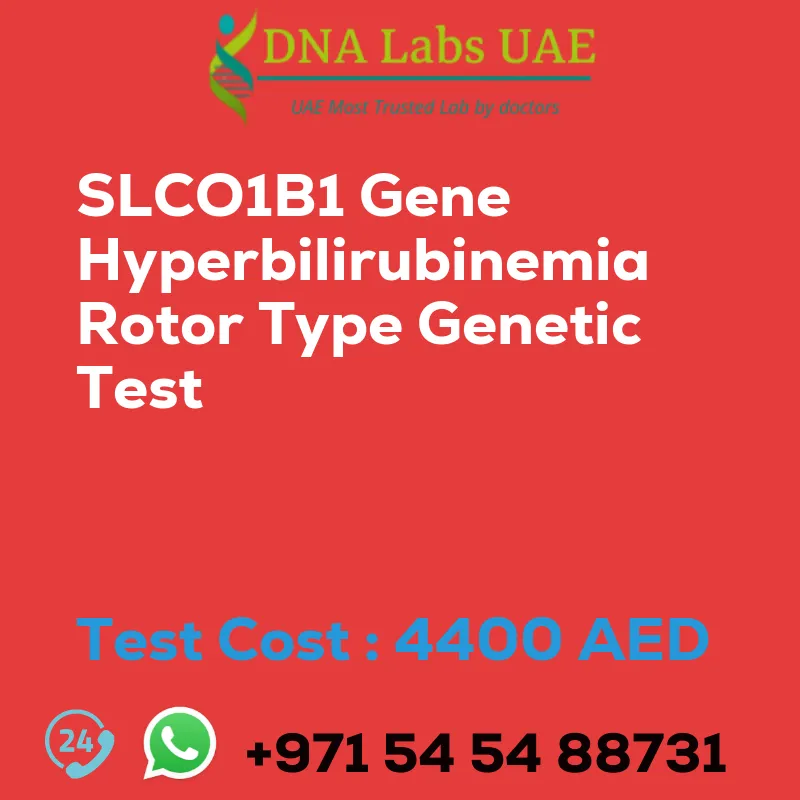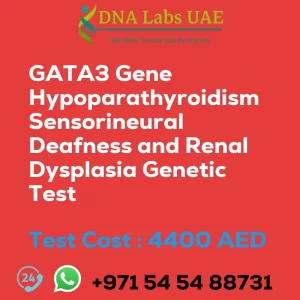SLCO1B1 Gene Hyperbilirubinemia Rotor type Genetic Test
At DNA Labs UAE, we offer the SLCO1B1 Gene Hyperbilirubinemia Rotor type Genetic Test at a cost of AED 4400.0.
Test Details
The SLCO1B1 gene is responsible for encoding a protein called organic anion transporting polypeptide 1B1 (OATP1B1). This protein is found in the liver and is involved in the transport of bilirubin, a yellow pigment produced during the breakdown of red blood cells.
Mutations in the SLCO1B1 gene can lead to a condition known as hyperbilirubinemia, Rotor type. Hyperbilirubinemia refers to high levels of bilirubin in the blood, which can cause yellowing of the skin and eyes (jaundice).
Rotor type hyperbilirubinemia is a relatively rare inherited disorder characterized by mild jaundice and elevated levels of bilirubin in the blood, but without any other liver abnormalities.
Test Components
- Price: AED 4400.0
- Sample Condition: Blood or Extracted DNA or One drop Blood on FTA Card
- Report Delivery: 3 to 4 Weeks
- Method: NGS Technology
- Test Type: Hepatology Nephrology Endocrinology Disorders
- Doctor: General Physician
- Test Department: Genetics
Pre Test Information
Prior to undergoing the SLCO1B1 Gene Hyperbilirubinemia Rotor type Genetic Test, it is important to provide the clinical history of the patient. Additionally, a genetic counseling session may be conducted to draw a pedigree chart of family members affected with SLCO1B1 Gene Hyperbilirubinemia, Rotor type NGS Genetic DNA Test gene SLCO1B1.
NGS Technology
NGS (Next-Generation Sequencing) genetic testing is a technique used to analyze multiple genes simultaneously. In the context of hyperbilirubinemia, NGS genetic testing can be used to identify mutations in the SLCO1B1 gene that may be causing the condition.
This type of testing can provide a comprehensive analysis of multiple genes, allowing for a more accurate diagnosis and potentially guiding treatment decisions.
It’s important to note that genetic testing should always be done under the guidance of a healthcare professional, such as a genetic counselor or medical geneticist, who can interpret the results and provide appropriate counseling and management recommendations.
| Test Name | SLCO1B1 Gene Hyperbilirubinemia Rotor type Genetic Test |
|---|---|
| Components | |
| Price | 4400.0 AED |
| Sample Condition | Blood or Extracted DNA or One drop Blood on FTA Card |
| Report Delivery | 3 to 4 Weeks |
| Method | NGS Technology |
| Test type | Hepatology Nephrology Endocrinology Disorders |
| Doctor | General Physician |
| Test Department: | Genetics |
| Pre Test Information | Clinical History of Patient who is going for SLCO1B1 Gene Hyperbilirubinemia, Rotor type NGS Genetic DNA Test. A Genetic Counselling session to draw a pedigree chart of family members affected with SLCO1B1 Gene Hyperbilirubinemia, Rotor type NGS Genetic DNA Test gene SLCO1B1 |
| Test Details |
The SLCO1B1 gene is responsible for encoding a protein called organic anion transporting polypeptide 1B1 (OATP1B1). This protein is found in the liver and is involved in the transport of bilirubin, a yellow pigment produced during the breakdown of red blood cells. Mutations in the SLCO1B1 gene can lead to a condition known as hyperbilirubinemia, Rotor type. Hyperbilirubinemia refers to high levels of bilirubin in the blood, which can cause yellowing of the skin and eyes (jaundice). Rotor type hyperbilirubinemia is a relatively rare inherited disorder characterized by mild jaundice and elevated levels of bilirubin in the blood, but without any other liver abnormalities. NGS (Next-Generation Sequencing) genetic testing is a technique used to analyze multiple genes simultaneously. In the context of hyperbilirubinemia, NGS genetic testing can be used to identify mutations in the SLCO1B1 gene that may be causing the condition. This type of testing can provide a comprehensive analysis of multiple genes, allowing for a more accurate diagnosis and potentially guiding treatment decisions. It’s important to note that genetic testing should always be done under the guidance of a healthcare professional, such as a genetic counselor or medical geneticist, who can interpret the results and provide appropriate counseling and management recommendations. |








